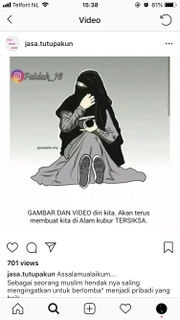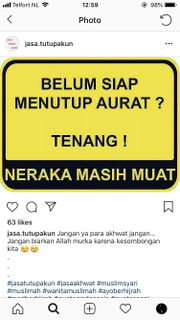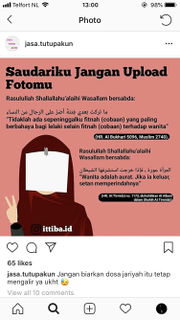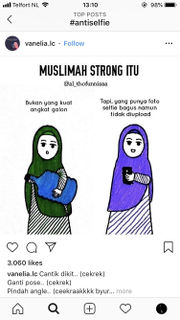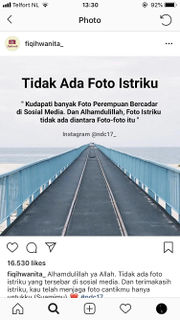User:Tash/grad testplay: Difference between revisions
No edit summary |
No edit summary |
||
| Line 8: | Line 8: | ||
* "The outburst of social media use in Indonesia has dramatically transformed the way information is created, disseminated, and distributed. In electoral politics, leaders have wholeheartedly embraced commercial branding techniques through networks of volunteers, buzzers, and micro-celebrities, saturating the public sphere with emotional messages designed to cultivate trust in their political brand. (...) <br><br> While facilitating freedom of expression, social media also encourages users to practice their freedom to hate, where individuals exercise their right to voice their opinions while actively silencing others. With such dynamics, the utilization of social media as a political tool in electoral campaigns further deepens divisions among social groups in society and amplifies animosity and intolerance against each other." Source: Lim, M. (2017) ‘Freedom to hate: social media, algorithmic enclaves, and the rise of tribal nationalism in Indonesia.’ Critical Asian Studies, 49(3): 411-427. | * "The outburst of social media use in Indonesia has dramatically transformed the way information is created, disseminated, and distributed. In electoral politics, leaders have wholeheartedly embraced commercial branding techniques through networks of volunteers, buzzers, and micro-celebrities, saturating the public sphere with emotional messages designed to cultivate trust in their political brand. (...) <br><br> While facilitating freedom of expression, social media also encourages users to practice their freedom to hate, where individuals exercise their right to voice their opinions while actively silencing others. With such dynamics, the utilization of social media as a political tool in electoral campaigns further deepens divisions among social groups in society and amplifies animosity and intolerance against each other." Source: Lim, M. (2017) ‘Freedom to hate: social media, algorithmic enclaves, and the rise of tribal nationalism in Indonesia.’ Critical Asian Studies, 49(3): 411-427. | ||
<gallery class="center" widths=180px heights=340px> | |||
Jasatutupakun1.jpg| Profile: 'Account closing service'. Bio: 'Admin is a Muslim sister / Facebook, Instagram, Twitter / Payment after.' | |||
Jasatutupakun2.jpg| 'Images and video of ourselves will haunt us in the afterlife' | |||
16.jpg| 'Not ready to cover your aurat? Don't worry, there's still space in hell' | |||
Jasa15.jpg| A happy customer | |||
Jasa14.jpg| 'My sister, don't upload your photo' | |||
Jasa12.jpg| 'A strong Muslimah is: Not one that can lift a gallon, but one that can take a good photo of herself and not upload it' | |||
Jasa3.jpg| 'Thank God, there are no photos of my wife on social media' | |||
Jasa5.jpg| Blurred women's faces on a popular Muslim account | |||
</gallery> | |||
Revision as of 14:28, 11 March 2019
Test Play: 11 March 2019
Introduction
Reading: on contemporary social media culture
- "For much of the past 20 years, Indonesia has been held up as a model of democratic transition for other countries, particularly those with significant Muslim populations. This view of Indonesia now needs rethinking. The country’s hard-won advances towards liberalism and tolerance may be under threat. This nation of more than 260 million people – over 85% of them Muslim – has often been called the “smiling face of Islam”, but that label may no longer apply.
The tensions over Islam are part of a much older struggle in Indonesia to determine who controls the interpretation of the religion, and thus religious power. However, the recent rise of conservative Islamist hardliners also resembles the rise of populism and conservative politics elsewhere in the world. Islamist conservatives are in many ways the local equivalent of America’s alt-right – and they are just as adept at online disruption and manipulation.
Research by State Islamic University Jakarta links the rise of religious intolerance among young Muslims to their increased access to the internet and social media. Indeed, Jakarta tweets more than any other city in the world, and Indonesians are very big users of Facebook, as well as WhatsApp, Instagram and Telegram." Source: https://theconversation.com/is-indonesia-retreating-from-democracy-99211
- "The outburst of social media use in Indonesia has dramatically transformed the way information is created, disseminated, and distributed. In electoral politics, leaders have wholeheartedly embraced commercial branding techniques through networks of volunteers, buzzers, and micro-celebrities, saturating the public sphere with emotional messages designed to cultivate trust in their political brand. (...)
While facilitating freedom of expression, social media also encourages users to practice their freedom to hate, where individuals exercise their right to voice their opinions while actively silencing others. With such dynamics, the utilization of social media as a political tool in electoral campaigns further deepens divisions among social groups in society and amplifies animosity and intolerance against each other." Source: Lim, M. (2017) ‘Freedom to hate: social media, algorithmic enclaves, and the rise of tribal nationalism in Indonesia.’ Critical Asian Studies, 49(3): 411-427.
- Between April and September 2018, Facebook removed 1.5 billion fake accounts from the platform. Source: https://thenextweb.com/facebook/2018/11/16/facebook-removed-1-5-billion-fake-accounts-between-april-and-september/
- "A significant feature of virtual interactions involve online deviance and trolling; these include behaviors that range from mild mischief, to offensive language, to hacking and trolling, and to the expression of complex social problems, such as by revolutionaries and freedom fighters. (...)
However, online trolling, in general, and the role of gender in perceiving, motivating, defining, enabling, or reacting to trolling, in particular, need to be better understood. Female trolls and deviants have not been well studied because they are a minority of online deviants and traditionally excluded from online deviant subcultures. However, an emerging body of cyberfeminism research document the developing trend of women deviants employing the Internet to accomplish ideological goals." Source: Sanfilippo, M. & Fichman, P. (2015) The Bad Boys and Girls of Cyberspace: How Gender and Context Impact Perception of and Reaction to Trolling. Social Science Computer Review 2015, Vol. 33(2) 163-180.
Reading: on tactical media and games
- "To ask of media interventions, Does it work? would be to tap into such questions as, Has it raised public awareness and support? Has it affected government policy? Is there a tangible political outcome? However, to ask instead, Does it play? would be to tap into quite different sorts of questions—questions that point toward the creators or participants and toward the users of the project, rather than toward the policymakers, governments, and corporations, which are the usual targets of contemporary activist interventions.
To ask, Does it play? would be to open up such questions as, Is it creative? Does it use humor? Does it encourage its users to use their imaginations?" Source: Melkle, G. (2008) Whacking Bush: Tactical Media as Play. In: Boler, M. (ed.) Digital Media and Democracy: Tactics in Hard Times. Cambridge: MIT Press.
- "Play is, by definition, a safety space. If a designer or artist can make safe spaces that allow the negotiation of real- world concepts, issues, and ideas, then a game can be successful in facilitating the exploration of innovative solutions for apparently intractable problems." Source: Flanagan, M. (2009) Critical Play: Radical Game Design. Cambridge: MIT Press.
Terms & definitions
- Astroturfing is the practice of masking the sponsors of a message or organization (e.g., political, advertising, religious or public relations) to make it appear as though it originates from and is supported by grassroots participants. This practice is about producing 'fake' or 'artificial' support.
- Trolling is a mischievous / deviant activity which involves starting quarrels or upsetting people on the Internet to distract and sow discord by posting inflammatory and digressive, extraneous, or off-topic messages in an online community.
- Flame bait is a message posted to a public Internet discussion group, such as a forum, newsgroup or mailing list, with the intent of provoking an angry response (a "flame") or argument over a topic the "troll" (original poster provoking angry response) often has no real interest in, and finds humour, or entertainment in reactions.
- Spamming is the use of messaging systems to send an unsolicited message (spam), especially advertising, as well as sending messages repeatedly on the same site.
- Disinformation campaigns the deliberate spreading of fake news items or misleading information in order to influence public opinion or obscure the truth.
- Fact-checking is the process of attempting to verify or disprove assertions made in an article, post or news item.
- Counterspeech is the practice of responding directly to hateful or harmful speech in an attempt to defuse or undermine it. Strategies include shaming and labeling, distraction, reinforcing common goals instead of differences, and warning of consequences.
- Doxing (from dox, abbreviation of documents) or doxxing, is the Internet-based practice of researching and broadcasting private or identifiable information (especially personally identifiable information) about an individual or organization.
- Scambaiting is the activity of posing as a potential victim to a scammer in order to waste their time and resources, gather information, and publicly expose them.
- Swatting is the harassment tactic of deceiving an emergency service (via such means as hoaxing an emergency services dispatcher) into sending a police and emergency service response team to another person's address.
- Troll-hunting is the practice of identifying and exposing trolls, or so-called sockpuppet accounts.
- Bot-hunting is the practice of identifying and exposing automated bots.
- Hashtag-jacking is the practice of appropriating and undermining an offensive hashtag, by flooding it with confrontational or opposing material.
- Geotag-jacking is the practice of appropriating and undermining a geolocation tag related to an offensive figure or organisation, by flooding it with confrontational or opposing material.
- Lulz an internet-based term for fun, laughter or amusement, especially at someone else's expense.
- Sockpuppet is an artificial online identity used for purposes of deception.
The Game
Live Action Instagram RPG
Knowing that social media functions by amplifying some voices while suppressing others, this interactive game will ask you to rethink your own relation to the medium. Like the practices of 'counterspeech' or 'contra-internet', it suggests new ways to talk back to social media spaces which have become especially hostile towards women. Through the performance and labour of roleplay, you are invited to critically explore this setting, and vicariously engage with its mechanisms and 'players'.
Unlike Gamification, which is the application of game-design elements to non-game contexts, this project relies on the already-existing gaming mechanisms in social media culture. As such, it is not the creation of a new game – but simply an invitation to play differently.
What you need
- Laptop & smartphone
- Internet connection
- Gameplay cards
Rules
- Always begin & end the game together
- Always play in teams of 2 or more
- Stay in character until further instruction
- Always follow back users who follow you
- Always screenshot your engagements in order of play
- Always tag / mention the game's main profile in your posts & comments, this way we can document your actions @raksasi1
- After the game, decide together whether to kill / donate the profile
How to play
In groups of two or more, create fake identities and profiles on Instagram.
Picking up cards from a deck, perform the actions on the card. Document the engagement you receive. More attention = more points.
The team with the most points after 10 rounds, wins.
Steps
- Divide into teams of 2.
- Each time picks up one character card. Discuss, in your teams, what your target and mission is.
- Create a new mail account with a free, secure service like Protonmail. All you need is a username & password.
- Open Instagram, and select: Add Account > Sign Up with email
- Set a username and password that cannot be traced back to you. Do not connect any of your personal accounts or contacts to the profile.
- Decide if you want a public or private profile. Turn off 'Hide offensive comments' in Settings > Privacy & Security > Comment Controls
- Set up your profile (what is your profile pic? who do you follow? what is in your bio? whose voice are you representing?).
- Once everyone is ready, we exchange handles, and all profiles follow the primary game profile. @raksasi1
- Before we play the first round, each team is given a set of 4 "Gardening cards". These may be employed only once, and in place of picking up an action card.
– Gardening card 1: Call allies to a conversation
– Gardening card 2: Call 1 ally to a conversation
– Gardening card 3: Maintain a conversation
– Gardening card 4: Skip action (this one can be employed after picking up an action card)
- Picking up cards from two decks, each team then completes 5 actions:
– Pick up action card + channel card
– Perform the chosen action on the chosen channel
– Make screenshot
– Save post to own archive
Always tag @raksasi1 in your comments and posts! - At the end of 5 rounds, do one round of evaluation and discussion.
- Picking up cards, each team then completes another 5 actions
- Final round of evaluation, count points and decide on fate of accounts
Point System
- For every follower at end of game: 1 point
- For every like on comments or posts: 2 points
- For every flagged comment or post: 4 points
- For every DM received: 3 points
- For every reply to a comment or post: 2 points


